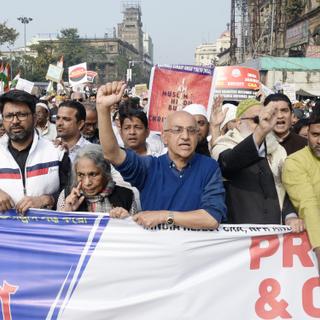


Modi hunts down his 'internal enemies' within India's civil society
InvestigationUnder the impetus of the nationalist prime minister, the government is orchestrating a radical campaign against NGOs and human rights groups. This witch-hunt also extends to the media and universities.
He regularly appears on the list of candidates for the Nobel Peace Prize. At 68, he has dedicated his life to fighting sectarianism in India and defending Muslims. Harsh Mander, a former senior civil servant and tireless human rights campaigner, woke up at 7:30 am on February 2 to find agents from the Central Bureau of Investigation (CBI), India's equivalent of the American FBI, at his door in the south of New Delhi. The officers suspected him of receiving foreign funds illegally. After a three-hour search he simply said: "My life and my work are my only response."
In his modest office at the Center for Equity Studies (CES), the think tank he founded in 2001, Mander displays a photograph of Martin Luther King. Another black-and-white photo shows Mahatma Gandhi with Jawaharlal Nehru and Maulana Azad, three figures in the struggle for India's independence and the establishment of a secular, multi-faith state.
These are values that Mander continues to staunchly defend in the face of the Hindu nationalists who have ruled the country for 10 years, advocating a purely Hindu nation, the antithesis of the vision of the founding fathers. In 2017, as lynchings of Muslims multiplied across India, he toured the country with his Karwan-e-Mohabbat (Caravan of Love) to "ask forgiveness" from the victims and "assure them that their tragedy would not be forgotten."

The prolific author – he wrote 25 books – and regular columnist for the independent press has seen most government investigative agencies pass through his office: the CBI, but also the tax authorities, the Directorate of Enforcement, specializing in economic crime, and even the National Commission for the Protection of Children's Rights. Although never formally charged in court, in June 2023, the Ministry of Home Affairs decided to suspend the think tank's license to receive foreign contributions.
Deprived of resources, Mander is trying to keep his research center alive through crowdfunding to avoid layoffs – four employees today, compared with over a hundred previously – and continue to support victims of hate crimes. The authorities' relentless pursuit of the organization has caused a stir. In a public letter published on February 3, 250 prominent figures condemned a "vindictive witch hunt" and charges against Mander that are "entirely fabricated and without any material basis." According to the signatories, "these egregious attacks on Harsh Mander and the CES are an attack on all of civil society in India and all those who work to promote constitutional values."
You have 88.22% of this article left to read. The rest is for subscribers only.
